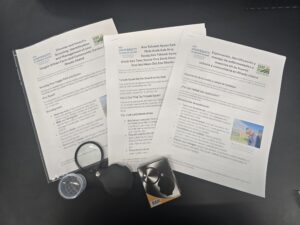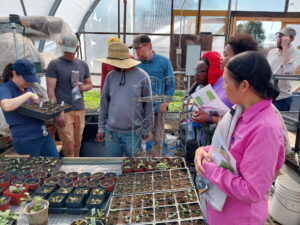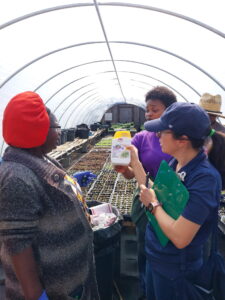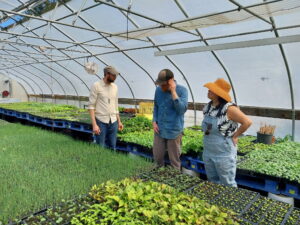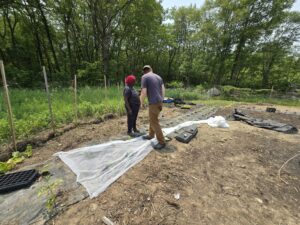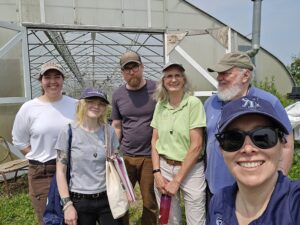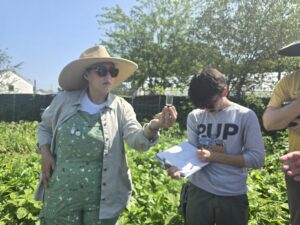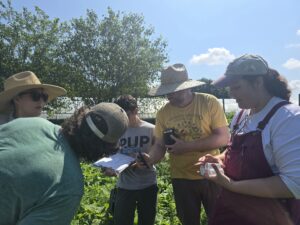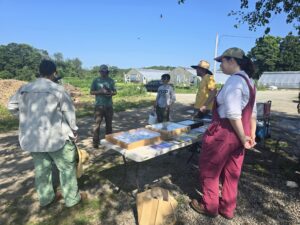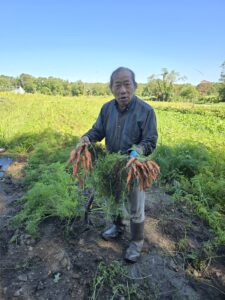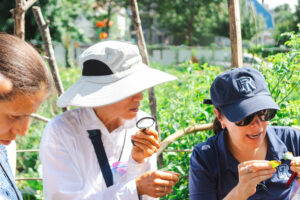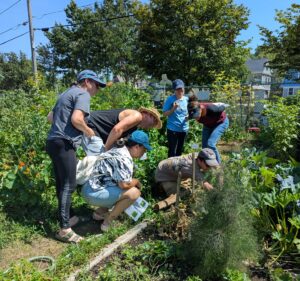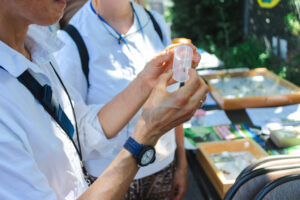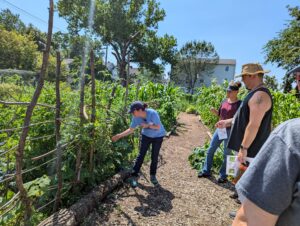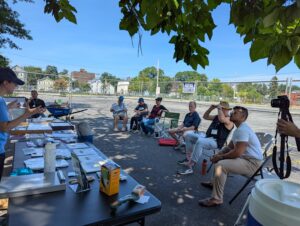Progress report for SNE23-012-RI
Project Information
Diseases and insects can be a significant challenge in urban agriculture. Some common diseases in urban farms and community gardens include leaf spots, root rot, damping off, and blight, among others. Insects such as aphids, caterpillars, and squash bugs can also be common pests. To prevent and manage diseases and insects, Service Providers, urban farmers will learn about insect and disease scouting and identification and managment. Insects and plant diseases can cause severe economic losses to farmers and negatively impact food security. Identifying the specific insect or disease can help in choosing the right management technique, which may include biological control, cultural control, or organic options to manage the problem. During the three years of the project, service providers and urban farmers will attend winter half-day workshops, Pest walks at local urban farms, and participate in demonstrations of a portable plant diagnostics laboratory. Plant diseases and insect identification guides will be produced and distributed among the service providers, participating farmers and gardeners.
Over the three years of this project, we will train 6 urban agricultural service providers to identify insects and plant diseases in urban farms. With these new skills, the agricultural service providers will mentor and assist 50 urban farmers in Rhode Island.
Description of Problem or Opportunity:
Rhode Island has a strong community farm, urban farms and garden movement, with more than 60 community gardens across the state and 70 acres in production. Many of these urban farmers grow crops that are sold in local farmers markets. The Southside Land Trust (SCLT) and African Alliance are nonprofit organizations that support urban farms and community gardens in the state. They provide resources, training, and networking opportunities to help urban farmers start and maintain urban farms and community gardens. Urban farms and community gardens in Rhode Island serve many purposes, including providing fresh produce to residents, creating green space in urban areas, and promoting community building and education. Many in Rhode Island are located on public land, such as city parks, state property or school grounds, while others are on private property or land owned by nonprofit organizations. Some urban farms and community gardens in Rhode Island are focused on serving specific populations, such as low-income residents, minority communities, seniors, or immigrants. Community farms and gardens in Rhode Island face challenges such as access to agricultural training, water, land availability, and funding.
Solution and Benefits:
Service Providers and urban farmers will get trained on pest scouting, identification, and management of diseases, which is crucial when growing crops. Insects and diseases can cause severe economic losses to farmers and negatively impact food security. Identifying the specific insect or disease helps to choose the right control measures, including biological, cultural, or other IPM strategies, to prevent or manage the problem. It also helps prevent the spread of insects and diseases to different crops or growing areas in a community garden. Additionally, identifying insects and diseases is essential for monitoring and preventing the development of pesticide resistance and unnecessary or ineffective treatments, thereby reducing the negative environmental impact. Therefore, insect and disease identification is essential for sustainable agriculture and food production.
Once an identification is made, then control measures must be considered. Organic control options will be explored in workshops and included in resources produced for this project.
Service Provider Interest:
At online meetings with Agricultural Service Providers from Southside Community Land Trust and the Northern Conservation District in March 2023, five Agricultural Service Providers expressed interest in attending winter educational workshops, pest-walk workshops, and in seeing demonstrations and obtaining portable diagnostic lab kits on insect and disease scouting and identification. They expressed the need for educational programs and material about insects and diseases in the community gardens in Rhode Island. They also would like insect and disease guides with many pictures and very few words, that can be used with people who speak any language. They requested the guides include plant problems on ethnic crops grown in urban farms and gardens. Current picture pest guides, such as the Northeast Vegetable and Strawberry Pest Identification Guide produced by Cooperative Extension, does not include pests of crops grown in many urban farms and gardens. The ethnic crops often have pests not seen on crops typically grown on other farms. It was also suggested to us by the Agricultural Service Providers from Southside Community Land Trust that our guide include pictures of underserved growers managing their crops.
Advisors/Cooperators
- - Technical Advisor (Educator)
- - Technical Advisor (Researcher)
- (Educator)
- (Educator)
- (Educator)
- (Educator)
Educational approach
Engagement:
Six Agricultural Service Providers that work directly with urban farmers will be recruited from the non-profit organization Southside Community Land Trust and the Northern Rhode Island Conservation District (NRICD). Promotional emails will be followed up by personal phone calls or in-person conversations, inviting them to the workshops and pest walks. Service Providers will be encouraged to invite urban farmers to all workshops.
The six service providers will be encouraged to participate in all three years of the project while we develop a pictorial pest management guide for them to use with their farmers. All 6 service providers work with underserved farmers in Rhode Island.
The participating agricultural service providers will be contacted via email after workshops to get their feedback and feedback from their farmers. We will share drafts of the pictorial pest guide as it is develop to ensure that the guide will serve their needs.
The Agricultural Service Providers will be encouraged to contact us to help solve difficult pest problems encountered by their farmers. The connection between URI Cooperative Extension, the service providers, and the urban farmers will continue into the future far beyond the time frame of this project.
Learning:
Through pest walks and workshops, Agricultural Service Providers and urban farmers will participate in winter workshops and summer pest walks provided by URI. Service providers and urban farmers will increase their knowledge on scouting and identification of insects and diseases in urban farms and community gardens and learn best management techniques. All three components of pest management will be maintained throughout the project: scouting, identification and management options.
Year One: Five urban farms will be visited with one or more service provider, to scout for insect and disease problems as well as abiotic plant problems. Special attention will be made to ethic crops growing at the farms. Many pictures will be taken to be used in the later developed pictorial pest guide.
Year Two: One half-day classroom workshop will be held in the winter at Southside Community Land Trust's building in Providence. Common insect and disease problems and abiotic problems found at urban farms and community gardens the previous year will be shared with service providers and urban farmers. During the growing season, two pest walks will be conducted for the urban service providers and urban farmers at two different urban farms. Additional pictures will be taken for the pictorial pest guide.
Year Three: During the winter, with input from the service providers and urban farmers, a pictorial pest guide will be developed, focusing on ethic crops grown on Rhode Island's urban farms. Staff at URI's Mallon Outreach Center will assist with the graphic design of the guide at no cost to the project. This guide will focus on crops not included in typical pest guides produced by Cooperative Extension. Two pest walk/diagnostic workshops will be held during the growing season, using the new pictorial pest guides.
Evaluation:
Following each workshop/pest walk, attendees will be surveyed at the end of the workshop series to determine whether or not they have improved their diagnostic techniques. At the evaluation, participants will be asked to describe how they used their new skills. The project plan may be amended depending on feedback from urban service providers and urban farmers.
Milestones
Year 1 Milestone 1 - Engagement
Ten service providers will be invited via email to discuss the possibility of offering winter workshops and summer pest walks in urban farms and community gardens. The urban farms are the ones where they currently assist urban farmers. We expect six of these people to participate throughout the project. The six service providers will be invited to all five workshops, and pest walks are planned for year one of this project. URI Cooperative Extension personnel will make follow-up phone calls if needed to confirm participation.
Proposed completion date: 11/1/24
Status: Complete
Accomplishments:
Engagement meetings: Engagement meetings were conducted in the spring and early summer of 2024 with service providers from South Side Community Land Trust and Northern Rhode Island Conservation District.
- On February 16, 2024, A meeting with Ben Torpey (Urban Edge Farm Manager) and Andrew Cook (Director of Community Gardens Network) from South Side Community Land Trust took place on February 16, 2024, in Providence, RI. From that meeting, they expressed the need to conduct two winter workshops in winter 2024 and three pest walks during the 2024 growing season (April, July, and September) at two urban farms in Rhode Island: Urban Edge and Good Earth, Cranston, Rhode Island.
- On March 6, 2024, A virtual meeting with Gennifer Keller and Todd Le from the Northern Rhode Island Conservation District took place on March 6 to discuss the need for Pest Walks Workshops in Community Gardens. We planned on conducting four URI SARE Workshops, Pest Walks for beginner urban farmers at Peace and Plenty Community Garden in Providence, Rhode Island.
- On June 27, 2024, a meeting with Ellen Asermely, Youth Programs Coordinator at Southside Community Land Trust, took place to conduct a pest walk with kids from their summer youth program at the Youth Garden in Providence, RI.
Year 1 Milestone 2 - Learning
Six Agricultural Service Providers will visit at least one urban farm with URI Cooperative Extension personnel (Keiddy and Heather) to scout for crop production problems. Each of the five urban farm scouting trips will involve surveying the crops grown at the farm, looking for insects, plant diseases, weeds, and cultural problems. URI Cooperative Extension personnel will take many photographs of crops and crop problems found on the farm.
Proposed completing date: 11/1/24
Status: Complete
Accomplishments:
1. Winter Workshops. Audience: Service Providers and Urban Farmers
Two In-person winter workshops were conducted at South Side Community Land Trust (SCLT) in Providence, RI.
- Winter Workshop I: Diseases and Insects Prevention in Urban Greenhouses and Farms. March 8. Duration: 2.5 hours . Participants: 15. In this workshop attends learned about Plant diseases and Insects Prevention, Scouting, Identification and Management in Greenhouses and High Tunnels and propagation greenhouses.
Service provider that attended the winter workshop I
-
- Andrew Cook, Learner. SCLT. Community gardens coordinator
- Ben Torpey. Learner. Urban Edge and Good earth farm manager
- Dan Roberts, Learner. SCLT Farmer training & equipment manager
- Ellen Asermely. Learner. SCLT. (Youth Program Coordinator & City Farm Steward)
- Amelia Lopez, Learner. SCLT. Farm-to-Market center support
- Julius Kolawole. Learner. executive director, African Alliance RI.
- Bruce Thompson. Learner. African Alliance RI.
- Chandelle Wilson. Lerner. SCLT. Youth education program manager
- Tammy Kim. SCLT. Office manager
- David Weisberger. Learner. URI Extension agricultural agent
- Winter Workshop II. Workshop. Title: Vegetable Diseases and Insects Scouting, Identification and Management in Urban Greenhouses and Farms. April 3, 2024. Duration: 2.5 hours. Participants: 15. The participants learned about plant diseases and insects prevention, scouting, identification and management in Urban Farms. The workshop was translated to Kirundi.
Service provider that attended the winter workshop II
- Andrew Cook, Learner. SCLT Community gardens coordinator
- Ben Torpey. Learner. Urban Edge and Good Earth farm manager
- Dan Roberts, Learner. SCLT Farmer training & equipment manager.
- Tammy Kim. SCLT. Office manager
2. Pest Walks, Urban Farms. Audience: Service Providers and Urban Farmers
Pest Walk I. April 3, 2024. Location: Urban Farms, Urban Edge Farm, and Good Earth Farm in Cranston, Rhode Island. Duration: 3 hours. Participants visited the greenhouses and high tunnels, where transplants were produced for the 2024 season for both farms. We toured the seedlings and propagating material of each grower in the greenhouses. The attendees learned about diseases and insect scouting, learned the principles and use of magnifying lenses, and magnifying lenses were provided to each attendee. We all scouted, identified, and gave management recommendations on the spot to service providers and farmers in each farm. Three samples for unknown diseases from peppers, brassicas, and rosemary were taken to the URI Plant Diagnostic Lab for Diagnosis. Samples were diagnosed, and management recommendations were made to the farm manager and farmers
Service provider that attended the Workshop-Pest Walk I.
- Andrew Cook, Learner. SCLT community gardens coordinator
- Dan Roberts, Learner. SCLT Farmer training & equipment manager
- Ben Torpey. Learner. Urban edge and good earth farm manager
- Heather Faubert. Learner. Diagnostician. URI Extension Retired
- David Weisberger. Teacher- Learner. URI soil scientist and Agriculture extension agent
- Keiddy Urrea-Morawicki. Learner - teacher . Plant pathologist and URI plant diagnostic lab director.
Pest Walk II. July 17th, 2024. Participants visited two Urban Farms: Urban Edge Farm and Good Earth Farm in Cranston, Rhode Island. Duration: 3 hours. We visited the different plots of the growers who expressed concerns or suspected diseases, insects, or other plant health problems. We visited the plots where growers expressed concerns about pest problems. The attendees learned about Vegetable Diseases and Insect Scouting, and on-site identification and management practices were provided. For the unknown pest problems, five samples of unknown diseases from zucchini, bell peppers, eggplant, amaranthus, and parsley were taken to the URI Plant Diagnostic Lab for Diagnosis. Samples were diagnosed, and management recommendations were made to the farm manager and urban farmers.
Service provider that attended the Workshop-Pest Walk II.
- Ben Torpey. Learner. Urban edge and good earth farm manager
- Andrew Cook, Learner. SCLT community gardens manager
- Blong Yang . Learner. SCLT. Garden Network Associate
- Dan Roberts, Learner. SCLT Farmer training & equipment manager.
- Heather Faubert. Learner. URI Extension Retired
- Leia Fagundes. Learner. URI. Fellow student at the URI Plant Diagnostic Lab.
- David Weisberger. Learner- teacher. URI. Soil scientist and Agriculture Extension Agent
- Keiddy Urrea-Morawicki. Learner - teacher . Plant Pathologist and URI plant diagnostic lab director.
Pest Walk III. September 18, 2024. Participants visited two urban farms, Urban Edge Farm and Good Earth Farm, in Cranston, Rhode Island. Duration: 3 hours. We visited the different plots of the growers that expressed concerns or suspected diseases, insects, or other plant health problems. The attendees learned about vegetable diseases and insect scouting, identification and management practices, information that was provided on-site top the service providers (farm managers) and urban farmers.
Service providers that attended the Workshop-Pest Walk III.
- Andrew Cook, Learner. SCLT Community Garden Manager.
- Dan Roberts, Learner. SCLT Farmer training & equipment manager.
- Ben Torpey. Learner. SCLT. Urban Edge and Good earth farm manager
- Dan Robbison, Learner. SCLT. Farmer training & equipment manager
- David Weisberger. Learner. Teacher- learner. URI soil scientist and agriculture extension agent
- Heather Faubert. Teacher. Diagnostician. URI Extension Retired
- Keiddy Urrea-Morawicki. Teacher. Plant pathologist and URI plant diagnostic lab director
Pest Walk IV. July 15th, 2024. SCLT Youth Community Garden, Providence Rhode Island. Duration: 2 hours
This workshop followed the same format as the pest walks at the urban farms and community gardens. The participants learned the importance of scouting, identifying and managing insects and diseases in their urban farms and gardens. They have to opportunity to learn the use of the magnifying glass and practice it by scouting their own crops.
Service providers that attended the Workshop-Pest Walk IV
- Ellen Asermely . Lerner. (Youth Program Coordinator & City Farm Steward); Ellen was a learner. who helped the youth program participants in the summer with the scouting, management
- Raffini. Learner. SCLT. Youth Program Coordinator
- Heather Faubert. Teacher. Diagnostician. URI Extension Retired.
- Keiddy Urrea-Morawicki. Teacher. Director of the URI Plant diagnostic lab.
Urban youth farmers participants: 8
Total participants: 12
Below are some photos from the Pest Walks in 2024 at urban farms
3. Pest Walk conducted in collaboration with Northern Rhode Island Conservancy District. Community Gardens Audience: Beginning urban farmers.
Pest Walks_ Community Gardens. Location: Peace and Plenty Community Garden, SCLT Garden. Providence Rhode Island
Four Pest Walks at Community Gardens were performed for year one of this project.
For all four pest walks at the community gardens, the participants learned about diseases, insects, and other health problems affecting plants in community gardens. A "Disease and Insect’s Scouting, Identification and Management of your Veggie Urban Farm and Community Garden in Rhode Island" fact Sheet was created and used to introduce the importance of diseases and insects in a vegetable garden. The fact sheet was translated to four languages: Spanish, Swahili, Hmong and Kinyarwanda. In the first part of the workshop, attendants learned about scouting and the use of magnifying glasses. Magnifying glasses and a printed version of a fact sheet in the participants language were provided for each participant. In the second part, participants learned about diseases and insects' symptoms and signs so they could be recognized in the garden. In the second part of the workshop, attendants were taken to the garden vegetable plots to scout for diseases and insects and between 8 to 10 stops represented either a disease or insect problem. During each stop, there was a brief description of each insect, disease, or other problem, tips on how to identify the pest, and suggestions on the management of the problem. The participants asked questions at each stop, as well as at the end of the pest walk. All the pest walks were simultaneously translated to Spanish, Swahili, and Kinyarwanda.
Workshop- Pest Walk V. August 8. Peace and Plenty Community Garden, SCLT Garden. Providence Rhode Island
- Gennifer Keller. Learner. Urban Agriculture Program Manager
- Todd Le. Learner. Environmental Education and Outreach Coordinator
- Doug Victor. Learner-Teacher. SCLT. Peace and Plenty Community Garden Manager
- Keiddy Urrea-Morawicki. Teacher. Plant Pathologist and URI plant diagnostic lab director
- Heather Faubert. Teacher. Diagnostician. URI Extension retired
Attendants: 18 beginner urban farmers and 5 service providers
Workshop- Pest Walk VI. August 19. Peace and Plenty Community Garden, SCLT Garden. Providence Rhode Island
- Gennifer Keller. Learner. NRICD. Urban Agriculture Program Manager
- Todd Le. Learner. NRIC. Environmental Education and Outreach Coordinator
- Doug Victor. Learner. SCLT. Peace and Plenty community garden manager
- Keiddy Urrea-Morawicki. Teacher. Plant pathologist and URI plant diagnostic lab director
- Heather Faubert. Teacher. Diagnostician, URI Extension retired
Attendants: 25 beginner urban farmers and 5 service providers
Workshop- Pest Walk VII. August 22, 2024. Peace and Plenty Community Garden, SCLT Garden. Providence Rhode Island
Attendants: 15 beginner garden growers and 5 Ag providers
- Gennifer Keller. Learner. Urban Agriculture Program Manager
- Todd Le. Learner. Environmental Education and Outreach Coordinator
- Doug Victor. Learner-Teacher. SCLT. Peace and Plenty Community Garden Manager
- Keiddy Urrea-Morawicki. Teacher. Plant Pathologist and URI plant diagnostic lab director
- Heather Faubert. URI Extension retired.
Attendants: 15 beginner urban farmers and 5 service providers
Workshop- Pest Walk VII. September 4. Peace and Plenty Community Garden, SCLT Garden. Providence Rhode Island
- Gennifer Keller. Learner. Urban Agriculture Program Manager
- Todd Le. Learner. Environmental Education and Outreach Coordinator
- Doug Victor. Learner-Teacher. SCLT. Peace and Plenty Community Garden Manager
- Keiddy Urrea-Morawicki. Teacher. Plant Pathologist and URI plant diagnostic lab director
- Heather Faubert. Diagnostician. URI Extension retired.
Attendants: 5 beginner urban farmers and 5 service providers
Below are some photos from the pest walks at the community garden.
Year 1 Milestone 3 - Evaluation
The six participating Agricultural Service Providers will be questioned either in person, telephone, or via email about there experience of scouting for plant problems in urban farms. URI Cooperative Extension personnel will ask the participants about what crops and plant problems they think should be included in a pictorial urban plant pest guide.
Proposed completion date: 12/31/24
Status: Complete
Accomplishments:
The evaluations from the Agricultural Service Providers and Farmers were conducted in person or by email.
- At the end of the first workshop, participants were asked for feedback on the material covered during the workshop. Participants said they learned about the importance of sanitation and the prevention of insects and diseases in their high tunnels and greenhouses. They expressed the need for a second Winter workshop.
-
Winter workshop II. A second winter workshop was conducted at SCLT in April 2024. After the first workshop the farmers and Ag providers thought it was helpful for them to learn about the most critical pests and diseases that could affect their pests. They were very engaged during the workshops and asked several questions. Also, they were very engaged during the presentations, where they recognized insects or diseases that they had in the crops in the past. The participants asked several questions during and after the presentations.
- An evaluation form was sent to the service providers. An Ag Service Provider marked that he Improved his awareness of the topics covered, Provided new knowledge and Provided new skills. They are willing to participate in a education program that I plan or participate in for next year's activities and use as a resource that will be available to producers.
- As an educator and facilitator I also improve my knowledge in Insects identification by teaching these workshops.
- The URI technical experts and service providers noticed improvements in the health and sanitation of the seedlings and plants produced in April and May at Good Earth and Urban Edge Farm.
- We noticed that the Winter webinars helped the farmers learn about pest scouting, prevention, and sanitation.
- We followed up on the problems observed in the previous pest walls and evaluated the recommended management approaches.
- An evaluation form was sent to the Ag Service providers. Service providers noted an improvement in their awareness of the topics covered, provided new knowledge and provided new skills. Service providers and urban farmers are willing to participate in an education program for next year's activities and use as a resource that will make available to producers
- As an educator and facilitator, I also improve my knowledge of insect and weed identification and management from my URI peers in the Pest Walks.
The Pest Walks in the Community Garden were evaluated in person by the end of each pest walk. I asked the participants for their input about the material covered. Most of them were very excited to learn the use of the magnifying glass for the first time and how useful it would be to scout their plants. During the pest walk, they recognized some of the insect and disease problems that they were experiencing on their own farms/plots for gardens. Each Pest walk was a small group, so every time, I improved on teaching them the most important ways to identify, scout, and manage pests in their own plants.
Year 2 Milestone 4 - Engagement
Ten urban Agricultural Service Providers will be invited via email to a half-day workshop on insect and plant disease diagnostics. The workshop will be held at the Southside Community Land Trust building in Providence. URI Cooperative Extension personnel will make follow-up phone calls if needed.
Proposed completion date: 3/31/25
Status: completed on November 24, 2024 and March 13, 2025.
Engagement meetings were conducted in Spring and Early summer of 2025 with Ag providers from South Side Community Land Trust and Northern Rhode Island Conservation District.
On November 13, 2024, Ben Torpey (Urban Edge and good earth farm manager) and Andrew Cook (Director of SCLT community gardens network) from South Side Community Land expressed their interest in the continuation of four winter workshops (February and March) and four Pest Walks during the 2025 growing season (April, May, July, and August) at two Urban Farms in Rhode Island: Urban Edge and Good Earth, Cranston, Rhode Island.
On March 13, 2025, a communication was held with Gennifer Keller and Todd Lee, educators at the Northern Rhode Island Conservation District (NRICD), to discuss the interest for Pest Walks in a Community Garden for their urban farmers program for the 2025 Summer season. Due to Federal funding cuts, the Northern Rhode Island Conservation District's educational programming for 2025 was reduced. It was decided to conduct two workshops, Pest Walks, at the Peace and Plenty Community Garden in Providence, Rhode Island.
Year 2 Milestone 5 - Learning
Six urban Agricultural Service Providers, urban farmers would attend a half-day workshop on scouting, identification and management of vegetable plant problem . URI Cooperative Extension personnel will take many photographs of crops and crop problems found on the farm.
Proposed completion date: 5/31/25
Status: Completed 2/5/25 - 9/3/25
Part 1 -Winter Workshops
Winter workshops. Audience: service providers and urban farms from URI, SCLT , African Alliance, and urban farmers.
Four in-person workshops were conducted at South Side Community Land Trust (SCLT) building in Providence, RI. For the year two of this project, there were two new topics for the winter workshops: soil and soil health, and weed identification and management in urban farms.
Winter Workshop I. February 5, 2025. Topic: Greenhouse Diseases and Insects: Prevention, Scouting, Identification, and Management in Urban Farms. Instructors: Keiddy Urrea-Morawick and Lisa Tewksbury. The workshop was translated simultaneously into Kirundi since most of the farmers who did not speak English spoke Kirundi. The SCLT borrowed translation equipment from NRICD, which worked better than without it.
Scope of the workshop: there were two presentations (60 minutes each) in which participants learned about the scouting, identification, and management of the most common diseases and insects in greenhouse and propagation houses, as well as their prevention and control. The participants also visited the propagation high tunnel at City Farm, one of the biggest SCLT community gardens. Rich Pederson, the "City Farm" Steward, demonstrated the sanitation measures he takes to ensure healthy seedling production. Rich explained the strategies he uses for propagating seedlings in high tunnels to prevent pest problems and reinforced the material covered in the workshop. He demonstrated the process of disinfecting the re-used pots, trays, benches, and floors inside the propagation high tunnels. Also, he explained how to prevent pests in the propagation high tunnel through proper sanitation, soil storage, water management, and other management practices.
Participants
a. Service providers
- Andrew Cook, Learner. SCLT community gardens coordinator
- Ben Torpey. Learner. Urban Edge and Good Earth farm manager
- Julius Kolawole. Learner. executive director African Alliance RI
- Ellen Asermely. Learner. SCLT. Youth Program Coordinator & City Farm Steward
- Rich Pederson. Teacher. SCLT. City Farm Steward
- David Weisberger. Learner. URI soil scientist and Agriculture extension agent
- Keiddy Urrea-Morawicki. Teacher. URI Plant Pathologist and plant diagnostic lab director
- Lisa Tewksbury. Teacher. URI Entomologist and biocontrol lab director
b. Urban farmers attended: eight and one interpreter. Farmers from Urban edge farm and Good earth farm , Sankofa RI community garden, Wilson community farm
Total participants: 17
Below are some photos from the winter workshop I and the tour of City Garden
Winter Workshop II. End February 19, 2025. Plant Diseases (Part 1) and Insect Scouting, Identification, and Management in Vegetables in Urban Farms. Lisa Tewksbury and Keiddy Urrea-Morawicki
Scope of the workshop: In this workshop, participants learned the concept of disease and insect (life cycle) and natural predators. Learned more about scouting, the principles of Integrated Pest Management, and resources available to help with both plant disease and insect identification and scouting.
The participants learned about the identification and management of the most common foliar, vascular, and soil-borne plant pathogens and insects, and natural control predators in urban vegetable farms in Rhode Island. Recommendations on biopesticides and other biological control products were provided for each pest. The PowerPoint was provided by email to participants.
a. Service providers that attended the winter workshop I
- Andrew Cook, Learner. SCLT community gardens manager
- Ben Torpey. Learner. Urban edge and good earth farm manager
- Michael Dare. Learner. African Alliance RI.
- Keiddy Urrea-Morawicki. Teacher - learner. URI Plant Pathologist and Plant Diagnostic Lab director.
- Lisa Tewksbury. Teacher. URI Entomologist and Biocontrol Lab director.
b. Urban farmers attended 11 and one interpreter. Farmers from Urban edge farm and Good earth farm , Sankofa RI community garden, Wilson community farm
Total participants: 17
Below are some photos from the winter workshop II
Winter Workshop III. March 5, 2025. Soil Health and Management. Instructor: David Weisberger, URI. The participants learned about soils and soil taxonomy, soil properties (including soil texture, pH, and essential nutrients), soil biology, and the role of microorganisms in soil health. Additionally, they explored soil compaction and its management on monoculture and small urban farms and gardens. The PowerPoint was emailed to participants. There was a short visit to a community garden, where Ben Torpey and David Weisberger discussed the importance of cover crops and their role in soil health.
Participants
a. Service providers that attended the Workshop III
- Andrew Cook, Lerner. SCLT. Community gardens coordinator
- Ben Torpey. Learner -teacher . Urban Edge and Good Earth farm manager
- Margaret DeVos. Learner. SCLT. SCLT Executive Director.
- David Weisberger. Teacher. URI soil scientist and Agriculture Extension Agent
- Keiddy Urrea-Morawicki. Learner. URI Plant pathologist and URI Plant Diagnostic Lab director.
b. Urban farmers that attended: eleven and one interpreter. Farmers from Urban edge farm and Good earth farm , Sankofa RI community garden, Wilson community farm
Total participants: 17
Below are some photos from the winter workshop III and the tour of the community garden
Winter Workshop IV. March 19, 2025. Weeds identification and managemental and vegetable disease management in Urban Farms. David Weisberger, URI, and Keiddy Urrea-Morawicki covered the most common weed species in Rhode Island farms and their management. Keiddy covered the Disease management using cultural control and biopesticides available for each disease. Both PowerPoints were provided by email to participants.
Service providers that attended the winter workshop IV
- Andrew Cook, Learner. SCLT. Community gardens coordinator
- Ben Torpey. Learner. Urban edge and good earth farm manager
- David Weisberger. Teacher. URI soil scientist and Agriculture Extension Agent
- Keiddy Urrea-Morawicki. Learner - teacher . Plant Pathologist and URI plant diagnostic lab director.
b. Urban farmers that attended: Ten and one interpreter. Farmers from Urban edge farm and Good earth farm , Sankofa RI community gardens, Wilson community farm.
Total participants: 15
Below is a photo from the last winter workshop IV
Part II Field Pest Walk at Urban Farms and Community Gardens
a. Pest Walks at SCLT Urban Farms
Audience: Service Providers and urban farmers
Four Pest Walks were conducted from April to September, 2025. All pest walks were simultaneously translated to Spanish and Kirundi as needed.
Pest Walk I. April 23, 2025. Topic: Diseases and Insects in Vegetable Greenhouses: Seedling production. Sanitation and Prevention: Scouting, Identification, and Management of pests in the greenhouse.
Scope of the Pest Walk: Each participant received a scouting kit that included a magnifying glass, an insect collection container, and a printed version of the scouting fact sheet. The pest walk started at the Good Earth high tunnels, and then we drove to Urban Edge high tunnels. Participants learned how to scout for insects and diseases on seedlings. There was a demonstration of the proper use of the magnifying lenses and a description of symptoms and signs to consider when scouting for pests in their propagating greenhouses. Pest and disease symptoms were noted during the pest walk for each plant species, and management recommendations were provided for each pest observed. Three samples of diseased plants were taken to the URI Diagnostic Lab for further diagnosis. The diagnostic reports were provided to the Ag providers: Ben Torpey and Dan Roberts.
Service providers
- Dan Roberts, Lerner. SCLT community gardens manager
- Ben Torpey. Learner. Urban edge and good earth farm manager
- Tammy Kim. Lerner. SCLT Administrative office.
- Heather Faubert. Lerner. URI Retired
- David Weisberger. Teacher. URI soil scientist and Agriculture Extension Agent
- Keiddy Urrea-Morawicki. Learner - teacher . Plant Pathologist and URI plant diagnostic lab director.
b. Farmers and gardeners attended: eight and one interpreter. Farmers from Urban edge farm and Good earth farm , and Wilson community farm
Total participants: 15
Below are photos of the scouting kit that included: a magnifying glass, an insect collection container, and a printed version of the scouting fact sheet (produced in year one of this project). Each participant was handed the fact sheet translated to the appropriated language.
Workshops- Pest Walk II. June 4, 2025. Topic: Vegetable Diseases and Insects: Scouting, identification and Management- Spring pest and Importance of pollinators (bees) in agricultural urban farms.
Scope of the Pest Walk: Each participant received a scouting kit if they did not attend the first pest walk. The pest walk started at the Urban Edge greenhouse and then visited four farmers' plots at the Urban Edge Farm. In each plot, participants learned how to scout for insects and diseases. There was again a demonstration of magnifying lenses and a description of symptoms and signs to consider when scouting for spring pests in their field. Pests and diseases that occur in late spring and early summer were the focus of this workshop. Symptoms and signs of the different diseases and insects were identified during the pest walk, and management recommendations were provided for each pest observed. Additionally, Fiona Dell 'Antonio, an intern from the URI Bee laboratory, was included in this pest walk. Fiona gave a brief introduction to the importance of pollinators in agriculture. Then, during the pest walk, Fiona collected and identified bee specimens from the different farmers' plots and communicated their identifications and recommendations to improve pollinators to the pest walk participants. Rebeca Brown demonstrated a cover net to prevent Colorado potato beetles on potato plants.
Service providers that attended the Pest Walk II
- Ben Torpey. Learner. Urban edge and good earth farm manager
- Lou Cabrera. Learner. URI Diagnostic Lab inter
- Dan Roberts, Learner. SCLT Farmer Training & Equipment Manager
- Heather Faubert. Teacher. Diagnostician. URI Extension Retired
- David Weisberger. Learner URI soil scientist and Agriculture Extension Agent
- Keiddy Urrea-Morawicki. Teacher. Plant Pathologist and URI plant diagnostic lab director
- Rebecca Brown. Teacher. URI Professor - Vegetable program director
- Fiona Dell'Antonio. Teacher - learner. URI Bee Lab fellow student.
b. Urban farmers that attended: five and one interpreter. Farmers from Urban Edge farm and Good Earth farm.
Total participants: 12
Below are photos from the pest walk II
Pest Walk III. July 16 , 2025. Topic: Vegetable Diseases and Insects: Scouting, identification and Management- Summer and Importance of pollinators (bees) in agricultural urban farms.
Scope of the Pest Walk. Topics: there were two main topics covered in this pest walk: a. Vegetable Diseases and Insects: Scouting, identification, and Management- Summer pests and b—importance of pollinators (bees) for agricultural urban farms. Pests and diseases affecting summer crops were the focus of this pest walk. In this pest walk, each participant received a scouting kit if they did not attend the first or second pest walk. We visited farmers who had reported pest problems to Ben Torpey, the farm manager. In each plot, participants learned how to scout for insects and diseases. There was again a demonstration of magnifying lenses and a description of symptoms and signs to consider when scouting for pests in their field. Symptoms and signs of the different diseases and insects were identified during the pest walk, and management recommendations were provided for each pest observed. Fiona Dell 'Antonio collected and identified bee specimens from the different farmers' plots and communicated the identification and recommendations to improve pollinators for the pest walk participants.
Service providers
- Ben Torpey. Learner. SCLT. Urban Edge and Good Earth farm manager
- Dan Roberts, Learner. SCLT. Farmer training & equipment manager
- Jack Bashaw. Learner. URI IPM assistant entomologist
- Liz Camps. Learner. NRCS. State agronomist
- Keiddy Urrea-Morawicki. Teacher. Plant Pathologist and URI Plant Diagnostic Lab Director
- Fiona Dell'Antonio. Teacher. URI Bee lab fellow student
- Lisa Tewksbury. Teacher. URI Entomologist and biocontrol lab director.
b. Urban Farmers that attended: five and one interpreter. Farmers from Urban Edge Farm and Good Earth Farm.
Total participants: 12
Below are photos from the pest walk IV
Pest Walk IV. September 3 , 2025. Topics: there were two main topics covered in this pest walk: a. Vegetable Diseases and Insects: Scouting, identification and Management- late summer pests
Scope of the pest walk: Each participant received a scouting kit if they did not attend the previous pest walk. We visited farmers who had reported pest problems to Dan Roberts and were not visited on the second or third pest walk. In each plot, participants learned how to scout for insects and diseases. There was again a demonstration of magnifying lenses and a description of symptoms and signs to consider when scouting for pests in their field. Pests and diseases present in late summer/early fall were the focus of this workshop. Symptoms and signs of the different diseases and insects were identified during the pest walk, and management recommendations were provided for each pest. There were fewer farmers and service providers for this pest walk.
Service providers
- Dan Roberts, Lerner. SCLT Farmer Training & Equipment Manager
- Jack Bashaw. Lerner - teacher. URI IPM entomologist inter
- Keiddy Urrea-Morawicki. Teacher. Plant Pathologist and URI plant diagnostic lab director
b. Urban Farmers that attended: four
Total participants: 7
Below are photos from the pest walk IV. Farmer harvesting a carrots at Urban Edge Farm
b. Pest Walk in collaboration with the Northern Rhode Island Conservancy District for their Urban Farmers program. Location: Peace and Plenty Community Garden (SCLT Garden). Providence Rhode Island
Two Pest Walks at Community Gardens were performed for year two of this project. The workshops were simultaneously translated to Spanish, Swahili, and Kinyarwanda.
Workshop- Pest Walk V. July 28, 2025
For all four workshops- pest walks, the participants learned about diseases, insects, and other health problems affecting plants in community gardens. A "Disease and Insects’ Scouting, Identification and Management of your Veggie Urban Farm and Community Garden in Rhode Island" fact Sheet was used to introduce the importance of scouting diseases and insects in community gardens. The fact sheet was translated into four languages: Spanish, Swahili, Hmong, and Kinyarwanda. In the first part of the workshop, attendants learned about scouting and the use of magnifying glasses. Magnifying glasses and a printed version of a fact sheet in the participants' language were provided for each participant. In the second part, participants learned about diseases and insects' symptoms and signs so they could be recognized in the garden. In the second part of the workshop, attendants were taken to the garden vegetable plots to scout for diseases and insects; between 8 and 10 stops featured either a disease or an insect problem. At each stop, there was a brief description of each insect, disease, or other problem, tips for identifying the pest, and suggestions for managing the problem. The participants asked questions at each stop and at the end of the Pest Walk. In this pest walk, Fiona talked about pollinators and their importance for urban farms and community gardens. Fiona collected some bees on-site and provided identification information to participants.
Service providers that attended the Pest Walk V
- Gennifer Keller. Learner. Urban Agriculture Program Manager
- Todd Le. Learner. Environmental Education and Outreach Coordinator
- Doug Victor. Learner. Peace and Plenty community garden manager
- Keiddy Urrea-Morawicki. Teacher.
- Fiona Dell'Antonio. Teacher. URI Bee lab educator
- Keiddy Urrea-Morawicki. Teacher. URI Plant pathologist and Plant Diagnostic Lab Director.
- Lisa Tewksbury. Teacher. URI Entomologist and biocontrol lab director.
Urban Farmers that attended: 4
Total participants: 11
Workshop- Pest Walk VI. July 29, 2025
Service Providers that attended,
- Gennifer Keller. Learner. Urban Agriculture Program Manager
- Todd Le. Learner. Environmental Education and Outreach Coordinator
- Doug Victor. Learner-Teacher. Peace and Plenty community garden manager
- Fiona Dell'Antonio. Teacher - learner. URI Bee lab intern
- Keiddy Urrea-Morawicki. Teacher. URI Plant pathologist and plant diagnostic lab director
- Jack Bashaw. Teacher. URI IPM entomologist assistant
Urban farmers: 4
Total participants 10
Below are photos from the pest walks V and VI at the Peace and Plenty Community Garden in Providence, RI
Year 2 Milestone 6 - Evaluation
Workshop participants will be surveyed through a group discussion at the end of the workshop and also at the end of the growing season with an online survey. Participants will be surveyed about the usefulness of the workshop and how it could be improved for future workshops. We will survey them as to whether or not they were able to help identify plant problems for the urban farmers they worked with in 2025.
Proposed completion date: 12/31/25
Winter Webinars – Summary evaluation and feedback
Participants (service providers and urban farmers) were requested to fill a feedback form at the end of the four winter workshop series. Below is the feedback from participants.
Status: completed: March 19, 2025
a. Feedback from Service Providers
Hundred percent of famers found the workshops helpful and reported improved knowledge in insect and disease scouting, identification, and management in vegetable farms and soil health, and weeds identification.
• Strongly valued continuation of winter workshops.
• Emphasized importance of soil health, sanitation, and scouting.
• Observed improvements among growers: fewer greenhouse pests/diseases, better field sanitation, reduced overwatering, improved soil fertility practices, and use of succession planting and mowing to reduce pest habitat.
• Improved understanding of sanitation of tools, equipment, and propagation spaces.
• Appreciated content tailored to the needs and climates of growers.
• Expressed interest in more emerging crop trials.
• Found extension support very responsive and helpful.
• Benefited from learning about general plant diagnostics beyond entomology.
• Noted multilingual training is valuable but can be improved.
• Would participate in future pest management training opportunities.
b. Feedback from Urban farmers
100% of farmers found the workshops helpful. 70% reported improved knowledge in insect and disease scouting, identification, and management in vegetable farms; soil health; and weed identification.
Farmers Identified areas for Improvement
• More information on beehive protection.
• Spanish translations of workshop content. Comment, the translation was not provided because there was only 1 participant but we will work on this in the future.
• Annual repetition of winter workshops.
Pest Walks – SCLT Urban Edge & Good Earth Farms
Participants (service providers and farmers) were requested to fill a feedback form at the end of the four pest walk series. Below is the feedback from participants.
Completed: September to November, 2025
a. Feedback from service providers:
• Pest walks provide essential support for Technical Assistance staff, especially with reduced funding.
• Valuable for advanced farmers but sometimes limited because issues were identified too late for effective organic treatment.
• Farmers requested more actionable, practical guidance.
• Farmers learned to identify common pests, plant damage, and relevant management practices.
• Walks helped identify severe diseases (fusarium and clubroot), leading to direct support and material procurement for growers.
• Pest walks were key to diagnosing problems that otherwise would have gone unnoticed.
• Found pest walks an effective and interactive outreach tool.
• Suggested preparing insect samples ahead of time to improve demonstrations.
• Plans to integrate more pest walks into IPM programming.
• Would benefit from participating in walks led by other specialists.
• Will apply pest walk learning to support growers with diagnosis during farm visits.
• Found grower feedback useful for future site visits.
• Recommends more staff support during walks to manage equipment and questions.
• Wants more training on pest and beneficial insect identification.
a. Feedback from urban farmers
- Found the pest walks very helpful for early identification of pest in the greenhouses
- Helped to improve proper application of organic products for management of insects and diseases
- Lack of written information and follow up on pest seen in their crops
- Want to participate in more pest walks next year
Winter workshops and Pest Walks_ IPM strategies evaluations
Based on feedback from Katie Campbell-Nelson early in 2025, five farmers were selected and IPM management strategies (task) was suggested to implement in 2025 season, depending of the pest problem each farmer ha in 2024. Attached are the two word documents.
1.IPM farmers task plan _ 2025 season
2025 IPM Goals Good Earth and Urban Edge Farmers Task Plan
2. IPM farmers task evaluation_2025 season
2025 IPM Good Earth and Urban Edge farmer’s task Evaluation
Below is a summary of the results.
- Farmers 1 and 2: Early scouting, sticky traps, sanitation, soil movement, and proper water management were very successful strategies for the early detection, prevention, and management of thrips, aphids, and diseases, including Pythium spp, specifically in propagation material and potting plants in greenhouses in Good Earth urban farm.
- Farmer 3: The use of resistant seed to powdery mildew was crucial for managing powdery mildew in cucumbers; there were no reports of powdery mildew in this pot during the 2025 growing season. The farmers also scout often.
Eggplant- Bitter ball (Eggplant). The grower followed a crop rotation strategy, planting eggplants in different plots. Unfortunately, in July, the eggplant bitter ball plants started to yellow. On July 16, we visited the plot and collected samples for diagnosis. The samples were diagnosed, and unfortunately, Fusarium wilt was diagnosed. The farmer will implement IPM management strategies for 2026 season. For now only cultural control, proper disposal of sick plant material and and avoid movement of soil from this plot was recommended. - Farmer 4.Farmer for removing crop residues in early winter (March 2025). In the spring, the plot was plowed to incorporate pathogen inoculum. When planting, the farmers reduce the number of seeds per row, increasing plant density. All these management practices helped control Alternaria blight. He did have less than 5 percent disease incidence during the growing season.
- Farmer 5. The farmer four did have the task of scouting for diseases and saw brown lesions on the tomato; however, the farmer was scouting every week but did not reach out to the farm manager or Keiddy Urrea-Morawicki, until two weeks later of symptoms appearance. A sample was collected, and the URI Diagnostic Laboratory diagnosed bacterial blight. After analyzing the samples, plant material removal was a practical strategy; at that point, more than 70 percent of the plants had symptoms. The farmers started ventilating the high tunnel earlier in the day to avoid condensation and also sprayed copper fungicide twice. Also, the weather improved. There was no rain for almost three weeks. The application of copper and ventilation were crucial strategies to control the disease. Farmer 5 did not incur losses from bacterial blight on tomatoes.
Pest Walks – Community Gardens
Participants (service providers and urban farmers) were requested to fill a feedback form at the end of every pest walk. Below is the feedback from participants.
Completed: July 28 and 29, 2025
a. Service providers feedback
• Peace and Plenty pest walks were especially well organized.
• Service providers wanted more one-on-one time to explain bee ecology and importance.
• Enjoyed interacting with growers and hope to participate again.
• Views pest walks as a valuable educational tool that encourages grower questions.
• Recommends pre-identifying pest damage and collecting insect samples to improve demonstrations.
• Benefited from similarities to twilight meetings and wants to attend more walks with varied specialists.
• Will use knowledge gained to better diagnose issues during future garden visits.
• Requests more assistants to improve walk logistics and interested in further training on pest and beneficial insect identification to help correct misconceptions.
b. Service providers feedback
Hundred percent of the gardeners found the pest walk helpful and expressed their interest in attending to more pest walks in the future.
• Learned to scout plants using magnifying lenses.
• Improved ability to distinguish pests and understand sanitation practices.
• Gained confidence in scouting for pests independently.
• Want continued education on pests observed.
• Interested in using biological controls.
• Learned not to compost diseased plant material.
Overall, for year two, four winter workshops and six pest walks were conducted. Based on feedback from service providers and urban farmers, the workshops, in conjunction with the pest walks, are a good educational approach for learning about scouting, identification, and management of insects and diseases in urban vegetable farms. This year, we had some issues with participation. Due to federal cuts, SCLT reduced its staff by 40 percent, mainly affecting service providers' attendance at pest walks. All the feedback from service providers and urban farmers will be used in the planning of the 2026 winter workshops and pest walks.
I got a lot of support from South Side Community Land Trust service providers; they hired a translator for every winter workshop and pest walk, and also purchased translation equipment, which mainly improved the translation of the winter workshops. Also provided the conference room at the Providence building, additionally, they promoted and encouraged their team and urban growers to attend the winter workshops and pest walks.
Also I got great support from my collaboration with the Northern Rhode Island conservancy district (NRCD) in organizing the pest walks at the community gardens. The NRICD helped with printing the educational material and provided translations to all pest walks.
Year 2 Milestone 7 - Engagement
Ten urban Agricultural Service Providers will be invited via email to two Pest Walks at urban farms led by URI Cooperative Extension personnel during the growing season. URI Cooperative Extension personnel will make followup phone calls if needed.
Proposed completion date: 8/31/25
Year 2 Milestone 8 - Learning
Six urban Agricultural Service Providers will attend at least one of the two Pest Walks at urban farms. The participants will be encouraged to invite urban farmers they work with. The Pest Walk will include training attendees how to scout for insect and disease problems at the urban farm and how to identify the problems once they are found.
Proposed completion date: 9/30/25
Year 2 Milestone 9 - Evaluation
All Pest Walk participants will be surveyed via a paper evaluation at the end of the Pest Walk. Attendees will also be evaluated at the end of the project to learn about their experiences in the 2026 growing seasons with regards to diagnosing plant problems.
Proposed completion date: 9/30/26
Year 3 Milestone 10 - Engagement
Ten urban Agricultural Service Providers will be sent drafts of the pictorial pest guide so that they can make comments and improvements to the guide. The ten service providers will be invited to participate in two Pest Walks at urban farms during the growing season, using the newly developed pictorial pest guides. They will be encouraged to invite urban farmers to attend the Pest Walks.
Proposed completion date: 8/31/26
Year 3 Milestone 11 - Learning
Six urban Agricultural Service Providers and URI Cooperative Extension personnel will use the newly developed pictorial pest guide at two Pest Walks at urban farms during the growing season. Participating growers and service providers will be able to keep a printed copy of the guide.
Proposed completion date: 8/31/26
Year 3 Milestone 12 - Evaluation
All Pest Walk participants will be asked to provide feedback on the guide at the end of each Pest Walk and also with a followup email. There will also be an open discussion at the end of the Pest Walk for participants to provide feedback for future engagement with URI and urban agriculture.
Proposed completion date: 9/30/26
Throughout the project, the advisory panel members will be asked for suggestions about upcoming trainings and their participation. Advisory panel will also be able to edit and contribute to the pictorial pest guide.
Milestone activities and participation summary
Participation summary:
Learning Outcomes
Performance Target Outcomes
Performance Target Outcomes - Service Providers
Target #1
Educate service providers and urban farmers on vegetable diseases and insects scouting, identification and management by winter workshops (classroom presentations and in classroom activities), and pest walks (hand on farm tours and demonstrations) and one to one consultations.
Urban Farms: urban farms vary between 0.5 to 2 acres
Community gardens: plots vary 0.1 to 0.2 acres
| Year 1 | Year 2 | Year 3 |
|---|---|---|
| 7 | 6 |
Educate service providers, urban farmers and gardeners Disease and Insect, scouting, pest ID and providing management recommendations. Participants submitted physical samples, photos and other questions to the lab via email, calls or text messages for further diagnosis after each pest walk.
| Year 1 | Year 2 | Year 3 |
|---|---|---|
| 100 | 105 |
| Year 1 | Year 2 | Year 3 |
|---|---|---|
0.1 to 2 acres |
0.1 to 2 acres |
| Activity | Year 1 | Year 2 | Year 3 | Total |
|---|---|---|---|---|
| Curricula, factsheets and other educational tools | 0 | 3 | 0 | 3 |
| Consultations | 199 | 100 | 0 | 299 |
| On-farm demonstrations | 37 | 15 | 0 | 52 |
| Tours | 9 | 0 | 0 | 9 |
| Webinars, talks and presentations | 4 | 5 | 0 | 9 |
| Workshops and field days | 16 | 5 | 0 | 21 |
A total of 10 service providers received verification requests regarding the outcomes of the winter workshops and pest-walk trainings. Of these, 6 responded and provided information about their educational activities and services. Responding service providers reported that they transferred the knowledge gained during the winter workshops and pest walks through one-on-one consultations, group workshops, presentations, field days, and other outreach events. Through these activities, they trained urban farmers in pest scouting, identification, and management practices.
As time permitted, service providers conducted follow-up visits with urban farmers to monitor pest issues and follow up on previous task that the farmers had adopted. They reported improvements in some farmers’ ability to identify pests promptly and implement management actions that reduced crop losses.
If some aspects of the target were not achieved or could not be verified, this was primarily due to lack of responses, and challenges contacting the service providers.
Performance Target Outcomes - Farmers
Target #1
100
Improve pest management in their crops by implementing different IPM strategies, including pest detection and identification (scouting), cultural control (sanitation, proper plant watering, reduced plant density, among others), and biological control (adequate use of biopesticides).
0.2 to 2
25
Learned the importance of different IPM strategies for the control of pest and other health problems in their crops. Learned about:
Cultural control as scouting (early pest detection) and proper identification, greenhouse ventilation, crop rotation, sanitation in the greenhouse and fields (removal of diseased crop residue), identification of weeds that can harbor insects and viruses in the greenhouses and fields, proper use and timing of biological control products. Also learned the importance of soil health and cover crops and the importance of pollinators in agricultural settings.
0.2 to 2
Additional Project Outcomes
Overall, I am very happy with the first-year educational methods; I think it was a good educational strategy to conduct the winter Workshops in the first year of the project. It was beneficial for Ag service providers and farmers to get an in-classroom overview of the Prevention of Pests in their greenhouses and high tunnels early in the season and then learn in the classroom about the most common diseases and insects: scouting, identification, and management. The participants were very engaged and willing to learn during the hands-on workshops. The Ag service providers and farmers were very engaged, asked several questions, and contributed to all our knowledge. It was great to invite a weed scientist and an entomologist to the Pest Walls; the Ag providers and Farmers had the opportunity to get information and recommendations in their own plots, which I think is very effective.
For next year, I need to implement better ways to assess the farms' improvement by adopting all the knowledge they are gaining and measuring how to improve their IPM strategies. I already talked with Katie Campbell-Nelson, and she gave me excellent ideas on how to do this.
SARE Outreach
- Feb 14 RIAgNotes. SARE Grants: $1.25 M available for service providers and graduate students to advance sustainable agriculture in the Northeast. #Contacts: 570
- March 1 Register for the SARE Partnership and Graduate Students Grants Q&A sessions In March.#Contacts: 570
- April 15. Tristate Workshop. Rhode SARE livestock . SARE livestock. #Contacts: 570
- June 12. Grant funding opportunities for farmers: NE SARE is offering a series of Q&A sessions related to the various grants it is offering for 2025 funding. #Contacts: 570
- Sept. 4. Northeast SARE farmer grants, which are due on Nov. 12. #Contacts: 570
- Nov 6. SARE Famers Grants Due Nov 12. #Contacts: 570.
- Nov 20. Northeast SARE has a new grant program. The Historically Underserved Farmer/Farming (HUF) Community grant program funds projects that create farming and food system opportunities for historically underserved farmers/farming communities and prioritizes work that engages, and is led by, people with experience from those communities. #Contacts: 570
The State Coordinator participated in Farmer's field and Twilight Farmers meetings during 2024, where Northeast SARE and SARE printed material, SARE USB Library drives and grant opportunities were advertised and distributed among participants. These combined efforts facilitate the adoption of sustainable agricultural practices in Rhode Island.
- RI Fruit Growers Association, Annual Meeting March 19, 6-8:00. #Contacts: 40
- RI Fruit Growers Association Twilight Meeting, Weds, May 22 at 5:30pm at Small World Farm, 229 Long Highway, Little Compton, RI. # # Contacts: 55
- RI Fruit Growers Association Twilight Meeting, April 16 5:30-7:30 at URI's East Farm. # Contacts: 35
- URI Research and Extension Field Day on the afternoon of Sunday, August 18. URI Agricultural Farm. # Contacts: 52
- Young Farmers Night at Saunderstown Garlic Farm next Weds. Oct. 30 from 4-6pm. #Contacts: 31
- URI -SARE-SCLT Winter Workshop 1. March 8, 2024. #Contacts: 14
- URI -SARE-SCLT Winter Workshop 2. April 3, 2024. #Contacts: 15
- URI -SARE-SCLT Workshop- Pest Walk 1. April 17, Cranston RI. #Contacts: 15
- URI -SARE-SCLT Workshop- Pest Walk 2. Cranston RI. #Contacts: 12
- URI -SARE-SCLT Workshop- Pest Walk 3. Cranston RI. #Contacts: 10
- URI -SARE - RI Northern Conservancy District - Community Garden, Workshop- Pest Walk 1. August 8, 2024. Peace and Plenty Community Garden . Providence, RI. #Contacts: 21
- URI -SARE - RI Northern Conservancy District - Community Garden, Workshop- Pest Walk 1. August 19, 2024. Peace and Plenty Community Garden. Providence, RI. #Contacts: 28.
- URI -SARE - RI Northern Conservancy District - Community Garden, Workshop- Pest Walk 1. August 22, 2024 Peace and Plenty Community Garden . Providence, RI. #Contacts: 15.
- URI -SARE - RI Northern Conservancy District - Community Garden, Workshop- Pest Walk 4. September 24, 2024. Peace and Plenty. Providence, RI. #Contacts: 8.
2025
- January 9 . RIAgNotes. 2025 Tri-State SARE Livestock webinars starting in February. #Contacts: 570
- June 25. Tri-State SARE, Pasture Based Livestock Production Workshop, Tuesday, July 8 . #Contacts: 570
- Oct 1. Northeast SARE Farmer Grant Calling for Proposals. #Contacts: 570
- Nov 14 .Northeast SARE: Four Grant Program Calls Open - $6.9M Available. #Contacts: 570
The State Coordinator participated in Farmer's field and Twilight Farmers meetings during 2024, where Northeast SARE and SARE printed material, SARE USB Library drives and grant opportunities were advertised and distributed among participants. These combined efforts facilitate the adoption of sustainable agricultural practices in Rhode Island.
- RI Fruit Growers Association, Annual Meeting March 4, 6-8:00. RI Farm Bureau office at 16 Nooseneck Hill Rd, West Greenwich. #Contacts: 32
- RI Fruit Growers Association Twilight Meeting, April 21. Phantom Farms in Cumberland. Contacts#40
- RI Fruit Growers Association Summer Twilight Meeting, Rocky Brook Farm, Middletown. # Contacts: 12
- Tomorrow's Young Farmer Night at Sweet Pea Farm. Conducted a Pest Walk #Contacts: 25
- URI -SARE-SCLT Winter Workshop 1. March 8, 2024. #Contacts: 17
- URI -SARE-SCLT Winter Workshop 2. April 3, 2024. #Contacts: 17
- URI -SARE-SCLT Winter Workshop 3.March 8, 2024. #Contacts: 17
URI -SARE-SCLT Winter Workshop 4. April 3, 2024. #Contacts: 15 - URI -SARE-SCLT Workshop- Pest Walk 1. April 17, Cranston RI. #Contacts: 15
- URI -SARE-SCLT Workshop- Pest Walk 2. Cranston RI. #Contacts: 12
- URI -SARE-SCLT Workshop- Pest Walk 3. Cranston RI. #Contacts: 12
- URI -SARE-SCLT Workshop- Pest Walk 3. Cranston RI. #Contacts: 5
- URI -SARE - RI Northern Conservancy District - Community Garden, Workshop- Pest Walk 1. July 28, 2025. Peace and Plenty Community Garden . Providence, RI. #Contacts: 7
- URI -SARE - RI Northern Conservancy District - Community Garden, Workshop- Pest Walk 2. July 29, 2025. Peace and Plenty Community Garden. Providence, RI. #Contacts: 4
Information Products
- Disease and Insect’s Scouting, Identification and Management of your Veggie Urban Farm and Community Garden in Rhode Island
- Disease and Insect’s Scouting, Identification and Management of your Veggie Urban Farm and Community Garden in Rhode Island- In Swahili
- in Disease and Insect’s Scouting, Identification and Management of your Veggie Urban Farm and Community Garden in Rhode Island- In Hmong
- Disease and Insect’s Scouting, Identification and Management of your Veggie Urban Farm and Community Garden in Rhode Island in Spanish
- Disease and Insect’s Scouting, Identification and Management of your Veggie Urban Farm and Community Garden in Rhode Island for Swahili speakers.
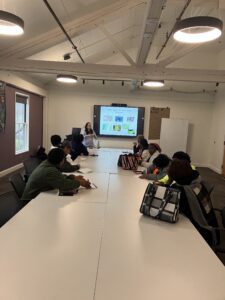
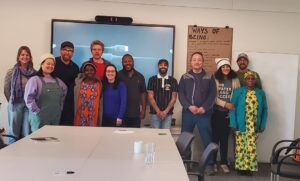
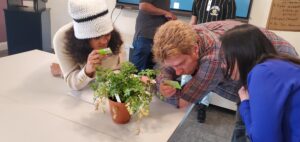
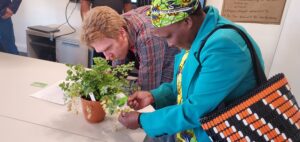
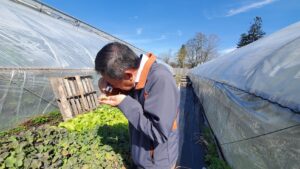
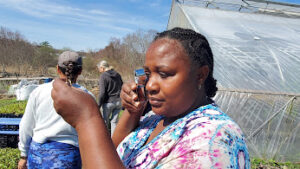
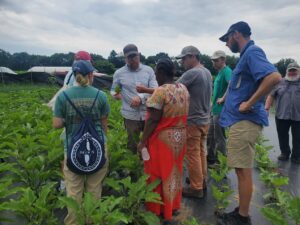
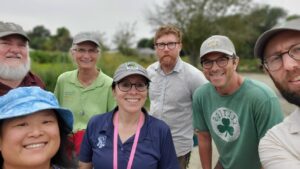
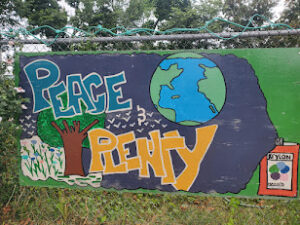
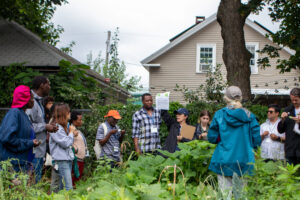
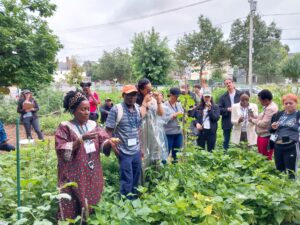
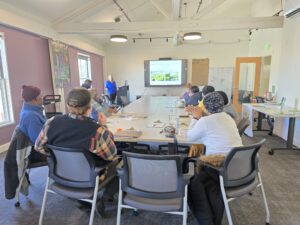
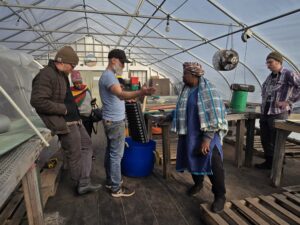
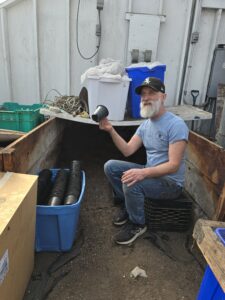
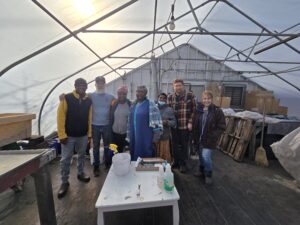
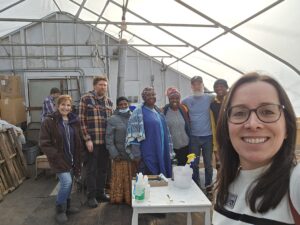
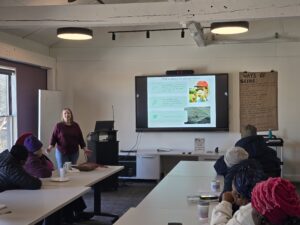
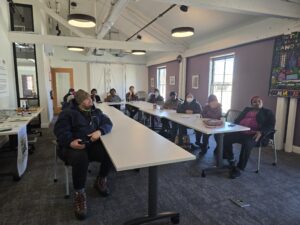
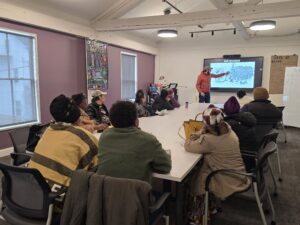
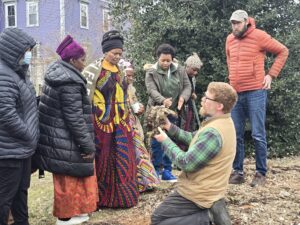
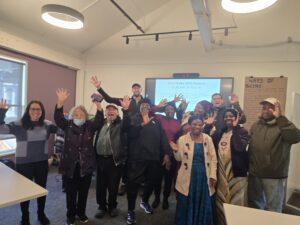 \
\